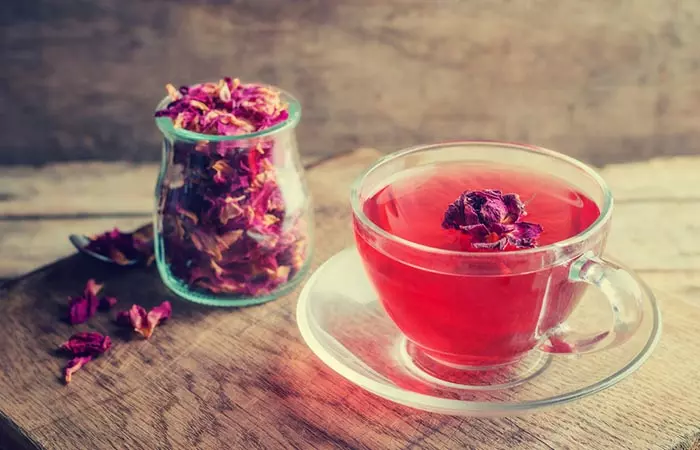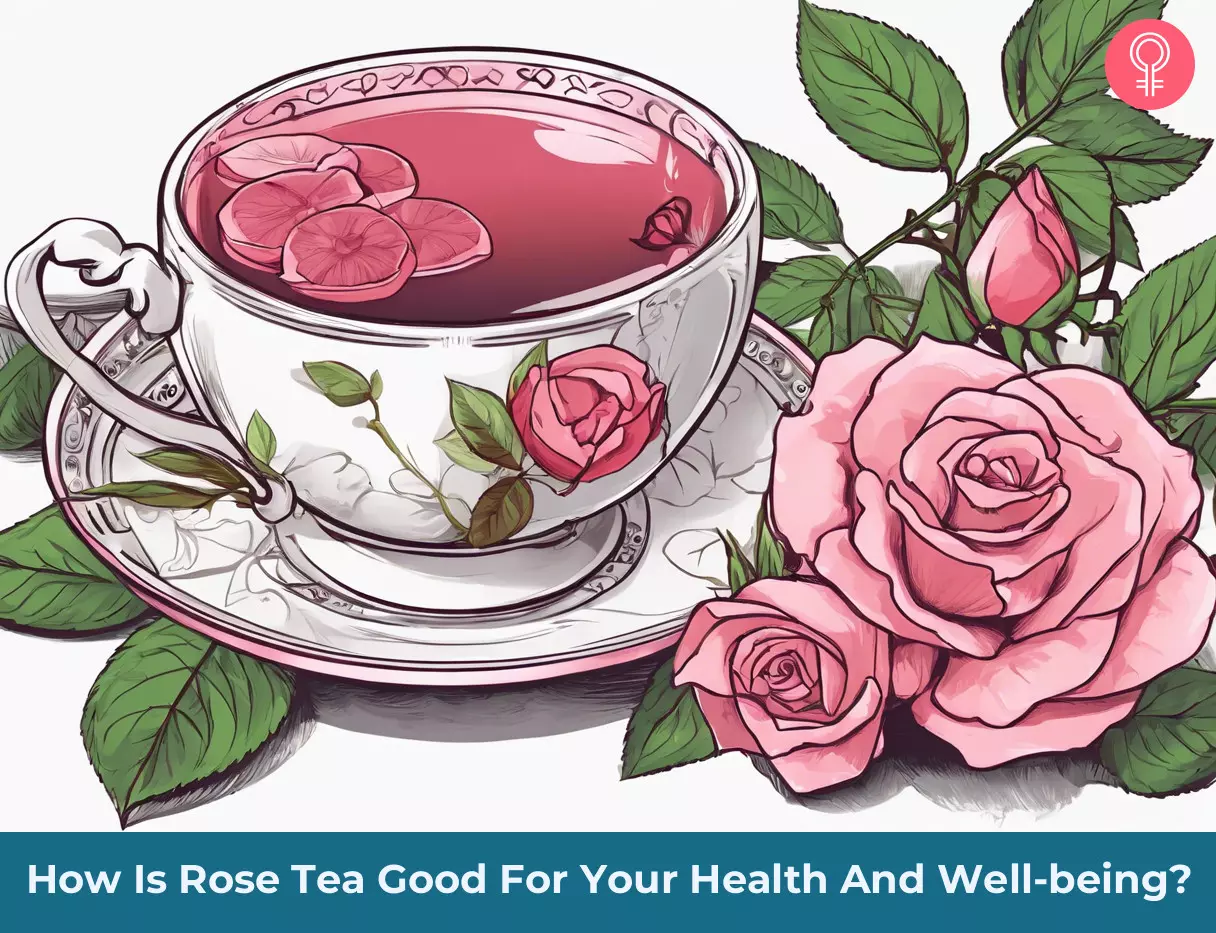Rose tea contains phytochemicals and has many health benefits. Evidence suggests that rose tea may relieve menstrual pain, provide stress relief, improve digestion, ease anxiety, promote relaxation, and help manage diabetes. This article discusses the natural benefits of rose tea, its nutritional profile, and any potential side effects. Scroll down to read more.
What Is Rose Tea?
Rose tea is a hot brew of dried rose petals and buds (Rosa damascena). It is not to be confused with rosehip tea, even though rose hips are also added to the tea blend sometimes. The petals from several cultivars of the rose species are used to make this floral tea. What Are Its Benefits? It is used to improve menstrual health, digestion, weight loss, hair growth, and diabetes management. Who Can Consume It? It is safe for anyone without an allergy to roses or the Rosaceae family. How Often? It can be consumed daily. Caution Excess consumption can lead to nausea or diarrhea.
Studies have found that the rose water extracts from the flower have anti-inflammatory and analgesic (painkilling) effects, balancing your body’s hydration. These could be linked to the bioactive components present in rose flowers (1), (2). In the following section, we will further delve in these benefits and find out what research says about them.
What Are The Benefits Of Drinking Rose Tea?
One property of rose tea that has been widely acknowledged is its antioxidant capacity. Rose tea is thought to improve menstrual health and reduce anxiety, pain, and inflammatory diseases.
1. May Improve Menstrual Health
Menstrual cramps could be a major problem for most women. According to studies, almost 50% of female adolescents showed a decrease in academic performance, sports participation, and socializing with friends due to menstrual cramps (3). Rose tea and its extracts have been used in folk medicine to alleviate menstrual pain and dysmenorrheai A medical term for painful and frequent menstrual cramps in the lower abdomen accompanied by cramps in the lower abdomen. . A study with 130 girls was set up to investigate this effect. The test group was given rose tea to drink, and intervention data was collected after one, three, and six months of the course (3). Results showed that the girls who drank rose tea felt less pain, anxiety, and distress during menstruation. Hence, beverages like rose tea are a potentially safe and simple treatment for dysmenorrheai A medical term for painful and frequent menstrual cramps in the lower abdomen accompanied by cramps in the lower abdomen. and premenstrual syndrome (PMS) (3).
2. May Improve Digestion And Relieve Constipation
The petals of rose have been used in traditional medicine to treat digestive problems. They were often eaten to solve stomach issues (2). Syrian, Lebanese, Assyrian, and rural Middle Eastern populations consume rose-based beverages. Rosebuds, flowers, or extract drops are added to these drinks. One such drink is Zhourat. Various rose elements are added to this herbal tea that is said to treat digestive problems (4). Adding Rosa damascena petals, buds, or oil increases the antioxidant potential of these drinks (5). Thus, having rose tea could be linked to digestive health. Iranian alternative medicine uses rose decoction as a laxative. Gol-e-Ghand Majoon is a traditional rose-based medicinal product that is prescribed as a laxative for treating constipation (5). Boiled extracts of Rosa damascena showed significant laxative effects when given to rats. The rose extracts increased the water content in feces and the frequency of defecation. They are thought to have achieved this by stimulating the movement of fluids in the intestines (4).
3. May Aid Weight Loss
Several studies have linked high inflammation to weight gain. Rose tea is known to fight inflammation (6), (7). Hence, the tea may help with weight loss. The beverages that are consumed daily, such as tea and coffee, contain some caffeine. Rose petal infusion does not contain tea blends and is caffeine-free. Hence, rose tea can be a wonderful alternative to your regular caffeinated beverages for holistic wellness. Rose tea may help flush out toxins from the body. Though there is limited research, anecdotal evidence suggests that taking 4 to 5 cups of the tea could help with weight loss. This may be achieved through water-induced thermogenesisi A medical process that causes an increase in the metabolic rate by raising the blood pressure due to adequate consumption of water. (8).
4. May Help Manage Diabetes
Consuming an alcohol extract of Rosa damascena was found to have an anti-diabetic effect in animal studies. It could help decrease blood glucose levels (9). It is suggested that this species of rose is a potent inhibitor of a glucose-metabolizing enzyme known as alpha-glucosidase (2). Rose extracts suppress carbohydrate absorption from the small intestine. They help reduce postprandial (post-meal) glucose levels and aid diabetes control (4). Rose tea is also rich in polyphenols that are known to reduce the risk of diabetes and cardiovascular diseases (10), (11).
5. May Relieve Anxiety And Pain
Drinking rose tea can help relieve stress and anxiety. The tea contains anti-inflammatory substances that may help in this regard (12). Rosa damascena, as a species, is also known to have analgesic properties (4). Rose aromatherapy has also been proven to improve mood and sleep. A study done on sleep-deprived rats showed that the extract of Rose (Rosa rugosa Thunb) can treat sleep deprivation by inhibiting the action of certain receptors (13). It may relieve depression, grief, tension, and pain.
6. May Aid Hair Growth
Rose petals, especially those of the white and pink roses, have excellent antioxidant and anti-allergic properties. A study conducted in South Korea found that white rose petals decreased the oxidation of lipid and protein in the hair cells (14). The rose phytochemicals can inhibit the secretion of sebum. Low levels of sebum can prevent itching and oily scalp issues. When added to hair products, like shampoos, rose extracts (from different species) can help reduce scalp inflammation as well (14). The ellagitannin and epigallocatechin gallate in rose petals can prevent hair loss and conditions like seborrheic dermatitisi A non-contagious skin condition that causes itchy red patches on the face and upper chest due to stress and hormonal changes. (14). Hence, drinking rose tea or applying its extracts topically may treat scalp inflammation and hair fall.
7. May Help Reduce Cancer Risk
Rose petals have been extensively studied for their cytotoxici A medical substance or a process that damages the cancerous cells or leaves the cells to die with toxic agents. and antioxidant effects (1). They were also found to have anti-mutagenic properties (15). Rose tea is rich in antioxidants that can help scavenge free radicals that are released during oxidative stress. If unchecked, this could increase the risk of chronic systemic diseases, including cancer. The free radicals caused by oxidative stress can cause damage at the cellular level by mutating the DNA (15), (16).
8. May Have Antimicrobial Effects
Certain cultivars of rose have been studied for their antimicrobial properties. The flavonoids, tannins, phenolic acids, and carotenoids in rose petals are responsible for their antimicrobial effects (1). Rose petals showed an inhibitory effect against several strains of bacteria. These include Staphylococcus epidermidis, S. aureus, Bacillus subtilis, Micrococcus luteus, Escherichia coli, Klebsiella pneumoniae, Pseudomonas aeruginosa, Proteus mirabilis. They also retarded the growth of some yeast species (17). The phytochemicals found in rose petals are responsible for these benefits. There are several anti-inflammatory, antioxidant, and analgesic agents in rose tea’s phytochemical profile. These are some potential health benefits of rose tea. But are there any spiritual benefits to drinking rose tea? Scroll down to know more.
Rose Tea Spiritual Benefits
Rose tea is known for its delicate flavor and calming properties. It is said to help ease physical and mental tension, making it easier to meditate or focus during spiritual practices. This tea’s soothing scent is thought to have a relaxing and calming impact, encouraging a sense of inner peace and tranquility. Its calming ability may help ease troubled minds, allowing you to focus on the positive aspects of your life. Many believe that consuming rose tea improves intuition and facilitates better communication with inner wisdom and spiritual guidance. It is thought to be a beverage that promotes reflection and meditation, and its scent also uplifts the senses.
What Are The Phytochemicals In Rose Tea?
The rose plant contains terpenes, glycosides, flavonoids, anthocyanins, carboxylic acids, and several simple and complex organic compounds. Myrcene, kaempferol, quercetin, tannins, and fatty oils are also found in its flowers. Most of the flavonoids are present in its essential oil (2). Biochemical analyses have revealed that the total content of phenolic compounds in most rose tea species was equal to or higher than that in green tea. Gallic acid was found in teas made from several rose cultivars. Free gallic acid is considered to be the main ingredient behind the strong antioxidant capacity of this beverage (2). Anthocyanins are another cluster of phytochemicals responsible for the color of rose petals. They also help in eliminating free radicals from your body. Together with phenolic acids and tannins, these pigments enhance the medicinal value of rose tea (2). Therefore, it is proven that this tea has a higher antioxidant potential than green and black teas. The polysaccharides it contains make this tea mildly sweet or neutral to taste. If you want to learn how to make rose tea, we’ve got you covered. Below is a simple recipe to brew rose tea with holistic benefits. You can brew rose tea with either fresh or dried rose petals.
How To Make Rose Tea At Home
Method 1: With Fresh Rose Petals
DIY: How To Dry Roses At Home You need sweet-tasting petals for drying. Most rose cultivars have bitter-tasting petals when dried. For more help, ask your local horticulture specialists or visit nurseries. All you need to do is:
Method 2: With Dried Rose Petals
If you find the rose flavor to be overpowering, you may use dried or fresh petals to make scented teas. Scented teas require just a few petals to garnish. Rose petals go well with oolong, green, and black teas. Sophie, a blogger, shared her experience of making and drinking rose tea in one of her blog posts. Documenting the surprise she felt at the taste of rose-ginger tea, she writes, “I was surprised by the velvety warm soft taste; the juxtaposition of hot ginger and cool rose on the tongue; like drinking a cup of love on a sunny day (i).”
How Much Rose Tea Can I Drink In A Day?
Drinking the herbal infusion in moderation is key. Though no quantitative studies have been done on the upper limit for consumption of rose tea, it is better to drink no more than 5 cups of this brew. Taking it in excess may cause certain side effects.
Rose Tea Side Effects
As per anecdotal evidence, consuming rose tea in excess could cause nausea or diarrhea. However, rose extracts are usually harmless. The FDA recognizes them as safe (18). But if you are sensitive to certain foods, it is best to talk to your doctor before consuming rose tea. Is rose tea good for skin? Rose tea contains antioxidants and vitamin C, and it could promote skin health and wellness. Although there is no direct evidence in this regard, roses have been traditionally and commercially used in the cosmetic and beauty industry. Does rose tea help you sleep? Rose tea is claimed to induce sleep as its aroma may relax the body. It may also relieve stress. What is the best time to drink rose tea? Rose tea can be had anytime. It can be especially beneficial if had before sleeping. It is caffeine-free and may help promote sleep. Can I drink rose tea every day? Yes, you can drink the tea every day as it offers many health benefits. Can you drink rose tea during pregnancy? The FDA has approved the safety of rose extracts. Hence, it could be safe to be taken during pregnancy. However, please consult a medical practitioner to be on the safer side. Is rose tea good for kidneys? Yes, Rosa damascena (the main ingredient in rose tea) has antioxidant properties that may help in treating kidney damage and preventing cellular degeneration (19). Is rose tea good for the liver? Yes, research suggests that Rosa damascena may subdue the accumulation of liver fat and reduce oxidative stress associated with liver dysfunction (20). Is rose tea good for cholesterol? Yes, Rosa damascena contains a bioactive compound called quercetin that may help reduce cholesterol levels in the body (20)
Illustration: How Is Rose Tea Good For Your Health And Well-being?
Watch this video to get a better understanding of the history of rose tea and some of its health benefits. Learn how about the nutrients it is packed with as well as its downsides.












